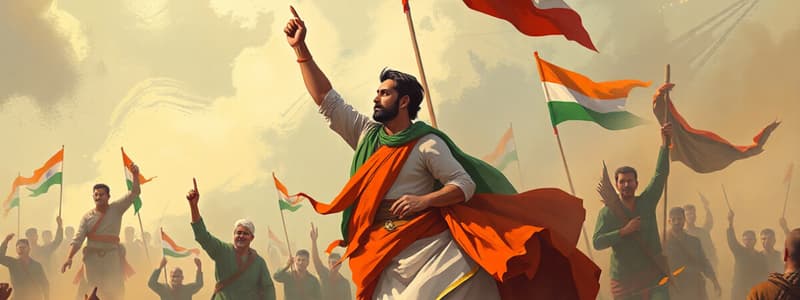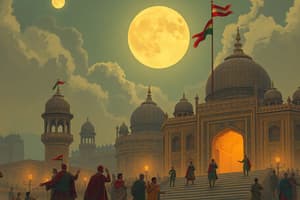Podcast
Questions and Answers
What was one key figure involved in the emergence of nationalism in India during the late 19th century?
What was one key figure involved in the emergence of nationalism in India during the late 19th century?
- Subhas Chandra Bose
- Bal Gangadhar Tilak (correct)
- Mahatma Gandhi
- Jawaharlal Nehru
Which movement was significant for its non-violent approach and aimed at gaining Indian independence?
Which movement was significant for its non-violent approach and aimed at gaining Indian independence?
- Revolt of 1857
- Civil Disobedience Movement
- Non-Cooperation Movement (correct)
- Quit India Movement
What year marked the launch of the Quit India Movement?
What year marked the launch of the Quit India Movement?
- 1942 (correct)
- 1945
- 1947
- 1940
Which social reformer is known for advocating women's rights and social equality?
Which social reformer is known for advocating women's rights and social equality?
What was a direct consequence of the Partition of India in 1947?
What was a direct consequence of the Partition of India in 1947?
Which event is referred to as the First War of Independence in India?
Which event is referred to as the First War of Independence in India?
What was a significant effect of British colonial economic policies on India?
What was a significant effect of British colonial economic policies on India?
Which movement, led by Gandhi, encouraged civil disobedience against British laws?
Which movement, led by Gandhi, encouraged civil disobedience against British laws?
Flashcards
Nationalism in India
Nationalism in India
Desire for self-governance that emerged in the late 19th century.
Dadabhai Naoroji
Dadabhai Naoroji
Advocated for economic reforms and highlighted the economic drain caused by British rule.
Bal Gangadhar Tilak
Bal Gangadhar Tilak
Promoted 'Swaraj' or self-rule and was known for his assertive leadership.
Indian National Congress (1885)
Indian National Congress (1885)
Served as a platform for political activism and demands for greater autonomy.
Signup and view all the flashcards
Non-Cooperation Movement (1920-22)
Non-Cooperation Movement (1920-22)
Mass mobilization against British rule promoting non-violent resistance.
Signup and view all the flashcards
Civil Disobedience Movement (1930-34)
Civil Disobedience Movement (1930-34)
Emphasized the rejection of British laws and encouraged the manufacturing of local goods.
Signup and view all the flashcards
Revolt of 1857
Revolt of 1857
Marked a pivotal uprising against British rule, instigating a reevaluation of colonial policies.
Signup and view all the flashcards
Raja Ram Mohan Roy
Raja Ram Mohan Roy
Advocated for women's rights and reforms in education.
Signup and view all the flashcardsStudy Notes
Overview of Class 8 History Curriculum
- Focus Areas:
- Nationalism in India
- The struggle for independence
- Historical events and figures
- Social and cultural movements
Key Topics
-
Nationalism in India
- Emergence of nationalism in the late 19th century.
- Key figures: Dadabhai Naoroji, Bal Gangadhar Tilak, and Gopal Krishna Gokhale.
- Role of Indian National Congress and its formation in 1885.
- Impact of World War I on Indian nationalism.
-
Freedom Struggle
- The significance of the Non-Cooperation Movement (1920-22).
- Civil Disobedience Movement (1930-34) led by Gandhi.
- Quit India Movement (1942) and its consequences.
- Role of key leaders: Mahatma Gandhi, Jawaharlal Nehru, Subhas Chandra Bose.
-
Partition of India
- Causes and consequences of the Partition in 1947.
- Impact on communal relations and migration.
- Key events during the Partition.
-
Social and Cultural Movements
- Role of social reformers: Raja Ram Mohan Roy, Jyotirao Phule, and Dr. B.R. Ambedkar.
- Women’s movements and their contributions.
- Spread of education and its influence on society.
-
Historical Events and Their Impact
- Significance of the Revolt of 1857 and its implications.
- Role of the British Raj in shaping modern India.
- Economic policies of the British and their effects on Indian society.
Important Dates
- 1857: First War of Independence.
- 1885: Formation of the Indian National Congress.
- 1919: Jallianwala Bagh massacre.
- 1942: Launch of the Quit India Movement.
- 1947: Partition of India and Independence.
Key Concepts
- Colonialism: Understanding its effects on Indian economy, society, and politics.
- Civil Rights: The evolution of civil rights movements in India.
- Cultural Nationalism: How culture played a role in the nationalist movement.
Review Strategies
- Create timelines for major events.
- Compare and contrast different movements and their leaders.
- Discuss the impact of historical events on contemporary India.
Suggested Activities
- Group discussions on key figures and their contributions.
- Role-playing significant events like the Quit India Movement.
- Research projects on social reformers and their impact on society.
Overview of Class 8 History Curriculum
- Focuses on nationalism, the struggle for independence, historical events, and social movements in India.
Nationalism in India
- Nationalism emerged in the late 19th century, driven by the desire for self-governance.
- Influential figures include Dadabhai Naoroji, who advocated for economic reforms; Bal Gangadhar Tilak, a proponent of "Swaraj"; and Gopal Krishna Gokhale, known for his moderate approach.
- The Indian National Congress was formed in 1885, serving as a platform for political activism and demands for greater autonomy.
- World War I caused significant shifts, fostering anti-colonial sentiments and increased demands for independence.
Freedom Struggle
- The Non-Cooperation Movement (1920-22) marked a mass mobilization against British rule, promoting non-violent resistance.
- The Civil Disobedience Movement (1930-34), led by Gandhi, emphasized the rejection of British laws and encouraged the manufacturing of local goods.
- The Quit India Movement (1942) called for immediate independence and saw widespread participation; it was met with severe repression.
- Key leaders in the freedom struggle include Mahatma Gandhi, promoting non-violent resistance, Jawaharlal Nehru, the future Prime Minister, and Subhas Chandra Bose, who favored armed struggle.
Partition of India
- The Partition in 1947 resulted from communal tensions and political disagreements, leading to the creation of India and Pakistan.
- It had profound impacts on communal relations, with mass migrations and violence occurring during the transition.
- Key events of the Partition include the mass exodus of populations and significant loss of life.
Social and Cultural Movements
- Social reformers like Raja Ram Mohan Roy championed reforms in education and women's rights; Jyotirao Phule worked for caste equality; Dr. B.R. Ambedkar focused on the rights of Untouchables.
- Women’s movements played a crucial role in advocating for gender equality and social change.
- The spread of education influenced social structures, elevating awareness and enabling reform efforts.
Historical Events and Their Impact
- The Revolt of 1857, known as the First War of Independence, marked a pivotal uprising against British rule and instigated a reevaluation of colonial policies.
- The British Raj significantly influenced modern India’s political and social framework, establishing administrative practices that persisted post-independence.
- British economic policies led to exploitation, affecting agriculture, industry, and contributing to widespread poverty in India.
Important Dates
- 1857 marks the First War of Independence against British sovereignty.
- 1885: Establishment of the Indian National Congress as a political entity.
- 1919: Jallianwala Bagh massacre highlighted British brutality and fueled resistance.
- 1942: Mobilization of the Quit India Movement, advocating for immediate freedom.
- 1947: The year of Partition and Indian Independence reshaping South Asia.
Key Concepts
- Colonialism: Examination of its detrimental effects on India’s economic growth, societal structure, and political status.
- Civil Rights: Tracking the evolution of civil rights movements, emphasizing equality and individual freedoms.
- Cultural Nationalism: Exploration of how cultural identity and heritage galvanized the nationalist movement.
Review Strategies
- Develop timelines to contextualize pivotal historical events.
- Engage in compare and contrast analyses of different movements and their leadership.
- Discuss historical influences on contemporary Indian society to enhance understanding.
Suggested Activities
- Organize group discussions focusing on influential figures and their societal contributions.
- Conduct role-playing sessions to reenact key events like the Quit India Movement for experiential learning.
- Assign research projects centered on social reformers to uncover their impact and legacy on Indian society.
Studying That Suits You
Use AI to generate personalized quizzes and flashcards to suit your learning preferences.




